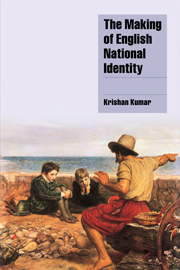Book contents
- Frontmatter
- Contents
- Preface
- 1 English or British? The question of English national identity
- 2 Nations and nationalism: civic, ethnic and imperial
- 3 When was England?
- 4 The first English Empire
- 5 The English nation: parent of nationalism?
- 6 The making of British identity
- 7 The moment of Englishness
- 8 The English and the British today
- Notes
- List of references
- Index
- Cambridge Cultural Social Studies
5 - The English nation: parent of nationalism?
Published online by Cambridge University Press: 07 December 2009
- Frontmatter
- Contents
- Preface
- 1 English or British? The question of English national identity
- 2 Nations and nationalism: civic, ethnic and imperial
- 3 When was England?
- 4 The first English Empire
- 5 The English nation: parent of nationalism?
- 6 The making of British identity
- 7 The moment of Englishness
- 8 The English and the British today
- Notes
- List of references
- Index
- Cambridge Cultural Social Studies
Summary
The birth of the English nation was not the birth of a nation; it was the birth of the nations, the birth of nationalism. England is where the process originated.
Liah Greenfeld (1992: 23)fluellen Captain MacMorris, I think, look you, under your correction, there is not many of your nation –
macmorris Of my nation? What ish my nation? Ish a villain and abastard and a knave and a rascal? What ish my nation?
Shakespeare, Henry V, Act 3 Scene 3But here I am in Kent and Christendom.
Thomas Wyatt (1503–42) (in Hammond 1996: 25)A sixteenth-century nationalism?
The rise of a school of British historians – James Campbell, Susan Reynolds, Patrick Wormald, John Gillingham, Rees Davies and others – proclaiming the existence of medieval English nationalism has been a lively feature of the contemporary scholarly scene. If their arguments do not convince – for reasons advanced in the preceding chapters – this is not to say that the challenge has not been stimulating. It has forced us to reconsider the meaning of nationalism. It has put in front of us a case that, were it to turn out as they present it, would be a remarkable example of precocity – yet another instance of that English tendency to go it alone. They raise again, that is, the whole question of ‘nations before nationalism’; were their strong expressions of national feeling and a real sense of nationhood before the coming of the ideology of nationalism in the nineteenth century?
- Type
- Chapter
- Information
- The Making of English National Identity , pp. 89 - 120Publisher: Cambridge University PressPrint publication year: 2003



